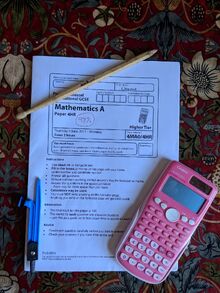
What are you taking on if you deregister your child to home educate (homeschool) for UK qualifications? It's certainly possible to home-educate through GCSEs - many home-educated children have obtained GCSEs and other qualifications from home education, sitting exams as private candidates at exam centres. However, you cannot usually continue with all the same qualifications that your child was doing at school.
This page lists the things you need to know in order to make an informed decision about whether to take your child out of school during the KS4 / GCSE period. First there is a checklist of things you'll need to think about, and then more detail on some elements. There is help available from the Home Education Exams community to do most of these things, and support from those who've been through it all before. It can be done - but be informed before you decide.
If you don't really want to home-educate but feel you have no other option because your child is too unwell to attend school, read about EOTAS first. Children have a right to free education arranged by the school or LA if they are unable to attend for health reasons, including mental health.
What would I be taking on?
- Responsibility for ensuring your child is given an efficient, full-time education.
- Choosing each qualification and syllabus to study and arranging how it will be studied.
- Finding alternative qualifications for those which your child cannot continue with at home.
- All costs of learning materials and exam entries.
- Finding an exam centre which will let your child sit exams there.
- Access Arrangements - eg extra time for dyslexia etc - can be very hard to arrange if you're home-educated; it can be difficult to find an exam centre to support them and you would need to work with them well in advance of the time your child sits exams. It is much easier to get access arrangements if you are enrolled in a school or college.
How can my child take exams?
You will need to find an exam centre which will enter your child for exams as an external candidate. This can be a school or a private exam centre. Most schools will not accept external candidates, but it's always worth asking nicely as your local ones might. Exam centres change their policy on taking external / private candidates frequently, so you need to check each year that a centre will still allow this.
Your child's current school may allow them to sit exams at the school. This opens up a lot more options for you than for most home educators as they may allow them to take exams with practical elements (see below).
If your child is in Year 11 and it is past the January census, in most cases their GCSE results will be added to the school's league table results regardless of whether you deregister them and sit the exam elsewhere. In this case, the school has an incentive to help you.
Can we just carry on with the syllabus studied at school?
For some subjects, probably - for others, you will need to change syllabuses and may not be able to transfer over any coursework/ practical elements of the exam already covered.
You need to know the exam board ('Awarding Organisation' - AQA, Edexcel etc.) and syllabus title and/or code that your child is doing.
If you have an exam centre which covers that exam board, you then need to look at whether the exam contains a practical element such as a speaking test, coursework project, science practicals etc.
What's the issue with practical elements?
Some GCSEs contain practical elements which involve a lot of extra work for the exam centre, so most centres won't accept external candidates for these. This may mean that you have to travel further to find a centre to accommodate you, and for some subjects you're likely to have to switch to an alternative qualification. Here's a quick summary of the subjects where these issues commonly arise, with a link to a subject page for each where you can read more:
- English - GCSE English language involves a compulsory speaking assessment, even though this doesn't contribute to your grade. A few exam centres will accept external candidates for this so it's worth asking, but most won't. The alternative is IGCSE (International GCSE ) English language, which is very similar but doesn't include a speaking element.
- Modern Foreign Languages - you can take GCSE or IGCSE syllabuses, but there is a one-off speaking assessment and you will have to find a centre to accommodate this. See Subjects for more detail on each language.
- Science - although the new 9-1 GCSE doesn't have a practical exam, the exam centre does have to sign saying they've offered all candidates the opportunity to do all the core practicals and they are supposed to ensure you've written them up, too. Most centres won't do this for external candidates. The alternative is IGCSE sciences, which are very similar but there will be some topic differences between exam boards.
- Music - music GCSE involves coursework and performance. It is not normally a realistic option if you're not in a school, because there are only a very few places which offer it to external candidates and it can be very expensive. In 2019 there appear to be 3 or 4 places nationwide where you can do it. The alternative is to take music grades to Grade 5 in an instrument plus Grade 5 Theory. This is usually accepted by colleges to show you're capable of taking music A-level.
- Art - the amount of supervision and length of the practical exam means that few exam centres will accept private candidates for this, although there are occasional opportunities through home-education / homeschool groups. Alternatives include Trinity Arts Awards and/or building a portfolio.
- Design and Technology - GCSE DT is 50% project and portfolio, involving many hours of supervised work. It is not a realistic option for most home educators.
- Physical Education - GCSE PE involves a large practical element and assessors must work with an exam centre which is prepared to administer this. Although occasionally a home-education group manages to organise a course, it's rare. People usually focus on building a portfolio of awards from national governing bodies of sports instead.
- Food Tech - involves a large practical project with around 30 hours of teacher-supervised work as part of the assessment. Not usually an option, although very occasionally a tutorial centre will run a class. Alternatives: build a portfolio with photos and write-ups, obtain a food hygiene certificate, study a distance-learning course.
How much does it cost to take exams?
There are two elements to this - the cost of the study materials, and the cost of the exam entries.
Exam costs include an entry fee plus an admin fee. The total is usually around £100 - £150 per GCSE just for written exams, although it can vary a lot. For exams with a speaking test, expect to pay £200 - £300 per subject.
Hampshire LA and a couple of other LAs will make some contribution towards exam costs, subject to conditions. Most don't.
Study materials can be anything from a £15 textbook and free online materials, up to hundreds of pounds per subject if you want a distance learning course or online classes. See the FAQ for more.
Can my child just go to college to get qualifications?
In some areas, home-educated children can attend college part-time from age 14 to obtain some qualifications. This is free and can be a great option. However:
- College courses for age 14-16 are only available at some colleges - check if they're near you.
- A limited range of qualifications is available - often English and maths GCSEs plus vocational courses.
- What's available varies locally so check with home educators in your area.
- Some programmes are aimed at children who find academic work difficult, so may be offering qualifications at a lower level than GCSE, eg Entry Level or Level 1 qualifications.
- GCSE courses on offer may only be Foundation level, which means that you cannot obtain the highest grades. If you want to go to college to study A-levels, check that you would be able to meet their admissions requirements for the courses you want.
- College courses for home-educated children are part-time and are only supposed to be a supplement to the education provided by the family.
Lots more information on College at 14-16.
Apprenticeships are strictly for ages 16+, so not an option at this stage.
I still want to deregister - what should I do next?
- Look at our Quick Start Guide and join the HE Exams networks.
- Read the FAQ for any other questions you have!
Or scroll through our homepage to see other options.
